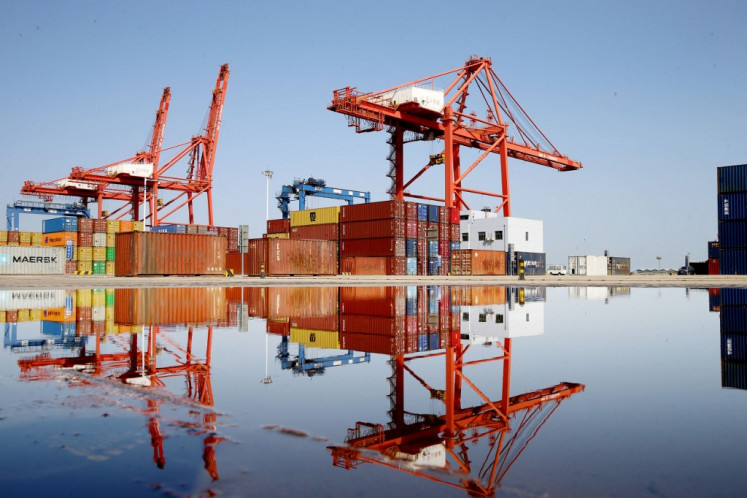Assessing the new Cabinet of President Yudhoyono
So many expectations were voiced by pundits after President Susilo Bambang Yudhoyono won overwhelmingly the presidential elections of 2009 in the first round with 60 percent of the votes
Change text size
Gift Premium Articles
to Anyone

S
o many expectations were voiced by pundits after President Susilo Bambang Yudhoyono won overwhelmingly the presidential elections of 2009 in the first round with 60 percent of the votes.
Many thought that since this would be his second and last term, he would like to leave behind a legacy of great success in alleviating poverty and unemployment, establishing a working democracy and good governance, and creating a unified nation with social justice respected by the region and globally. Because of these objectives, people expected he was going to select mainly professionals to form a unified, strong, capable Cabinet.
But the President seemingly thought otherwise. He has some good professionals taking care of the economy (11 ministers), but he has negated that with a lot more representatives from political parties (19 ministers), with a few ex-military and police figures (four ministers).
There might be some question marks over most representatives of parties who are new and untested (only 10 ministers from the previous Cabinet were re-appointed). He admittedly has removed some weak spots in the previous Cabinet, especially those responsible for the people's welfare, but some ministers in the economic team may lack competence.
A first observation is that the President seems to be putting stress on the importance of the support from a majority coalition in parliament.
In his first term, it can be recalled, he did not have majority support in parliament since his Democratic Party only had 7 percent of seats, and he was dependent on a coalition that was far from solid.
It should be underlined, however, that the Indonesian system is a presidential system, where the executive, legislative and judiciary are separate powers, with checks and balances between them. This is meant to prevent too much power falling to any one branch of the government.
A coalition with a majority in parliament might be needed in a parliamentary system, where the Prime Minister is elected by parliament based on a majority. In a presidential system, there are bound to be differences between parliament and the president.
Theoretically, as soon as members of the parties become members of the Cabinet, they are part of the presidential Cabinet and have to be loyal to the president.
But that does not mean their colleagues in parliament should automatically support the president's policies. The MPs are not elected by the president and have to represent the people who elected them.
On top of that, they have to be loyal to the programs and principles of the party. That is why the President should have a good team of assistants who lobby parliament and know how to strike compromises with the MPs. And on different policies there could be different coalitions.
There are three main fields of activities the President should concentrate upon. First and foremost is alleviation of poverty and unemployment/under-unemployment.
The main effort should be to get the economy moving again at a brisker pace than only 4 to 5 percent growth.
For this, it is not only those in charge of the macro economy who are important. The real economy has to move again, and this requires a lot of fresh investments, including FDI, besides public resources from the budget, as well as ODA and foreign loans.
This suggests the importance of infrastructure development (that was promised by the previous Cabinet but never delivered), better labor relations, an honest judiciary, less corruption and a more effective and efficient bureaucracy as well as political stability.
It should have an investment board that doesn't just give licenses, but also gives guidance especially to foreign investors going through the maze of bureaucracy, the rules and regulations, including in the autonomous regions.
Second, closely related with this first group of challenges, are the problems of the environment and climate change. These issues have become the most important ones globally, regionally and also nationally for the future. Nationally, not only is our quality of life at stake but also our security. Increased sea levels in the next 30 years or so could wipe 2,000 of our islands off the map.
The team to handle this should be strong, with proven capacity, competence and discipline. That includes capacity at the global and regional level, where negotiations and cooperation are taking place.
And since the President at the G20 Summit in Pittsburgh made a strong pledge, a credible national strategy has to be worked out. I am not willing to make any judgment on the people the President has selected for his Cabinet at this stage, before they are given the opportunity to do their job. But I am worried about the ability of the government to manage this particular critical issue.
This team should include the energy portfolio, the forestry, fisheries, transportation, agriculture and security portfolio, including the Foreign Ministry, supported by the macro-economic team, and should be headed by the President himself because of the critical nature of the issues and the huge problems to be faced.
The third issue of importance is formulating a foreign policy and new strategies to face the rapidly changing realities of regional and global affairs. East Asia is becoming the most important part of the world in economic terms.
For that, Indonesia has to adjust her policies and her relations with the region and globally. While ASEAN is still important in a sub-regional sense to maintain a peaceful and stable neighborhood for Indonesia, it can no longer be the cornerstone of Indonesia's foreign policy, because there are other issues arising that strategically will require greater attention from Indonesia, such as the rise of China, the new roles for Japan, India and Korea in the region, as well as how to keep the US in East Asia and how to establish a positive equilibrium for the region.
East Asian regionalism also has to be balanced with the trans-Pacific one, which means that ASEAN+3 has to be proactive in APEC. In East Asia proper, ASEAN+3 has to be for functional cooperation, including economic cooperation, and the EAS (East Asian Summit) should be for strategic dialogue at the summit level, with the prerequisite of inviting the US and possibly Russia to participate as members.
The G20 has become the most important global institution for reforms on global economic policies, rules and institutions. Indonesia, together with the other G20 members from East Asia (China, Japan, Korea and Australia) and India, should cooperate closely to provide input and feedback for the G20. This will enhance the region's role in shaping the global processes.
President Yudhoyono has won his re-election, which is a first in a democratic Indonesia. He should make maximum use of this. His first act in forming his Cabinet is seen by many with a lot of trepidation. Let him be aware of this.
The challenges he and the country will face will be huge and complicated. An effective leadership will be needed to meet this challenge.









